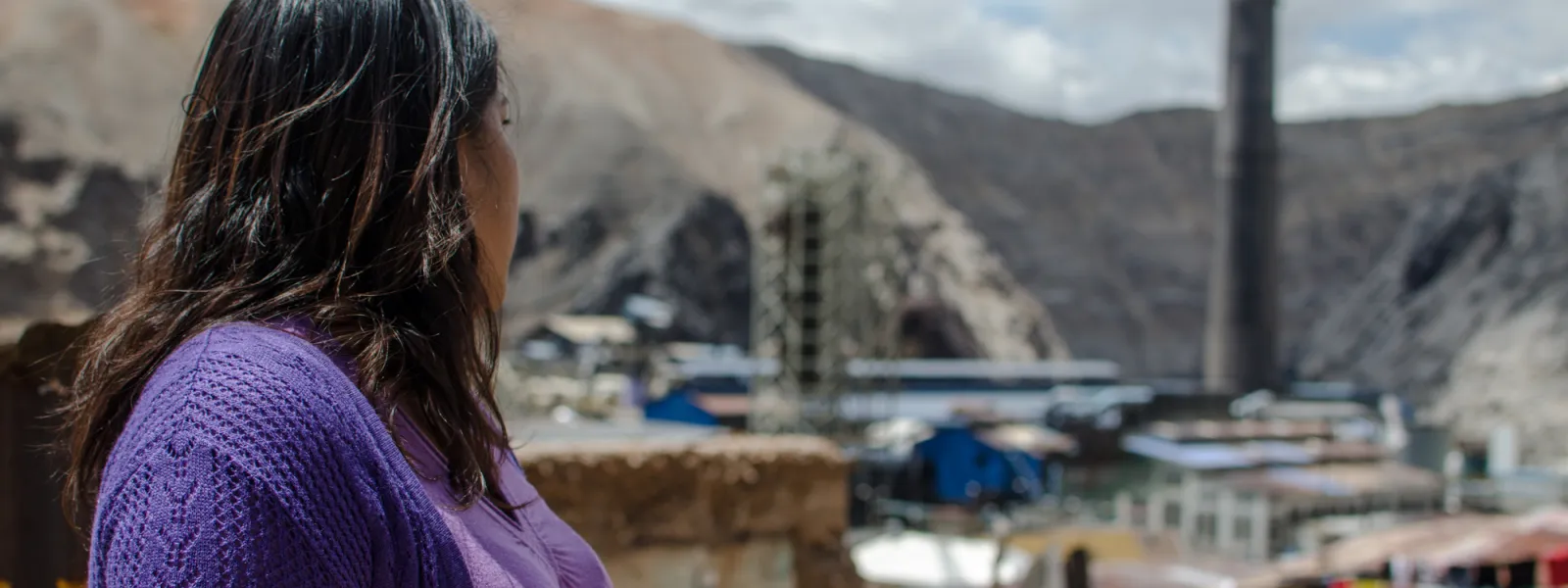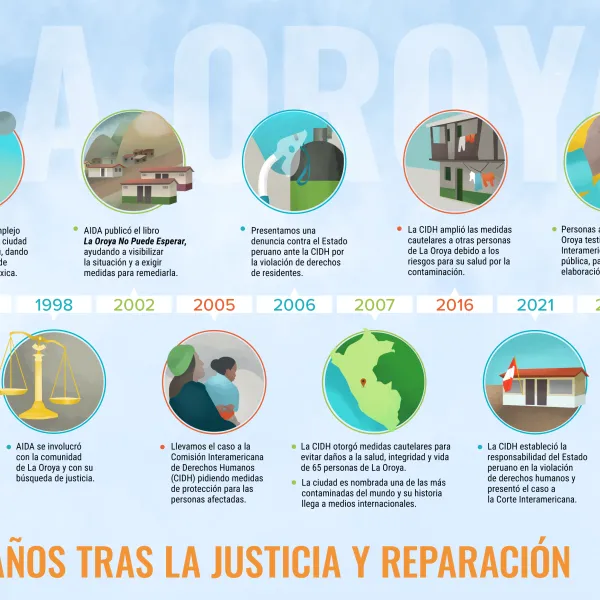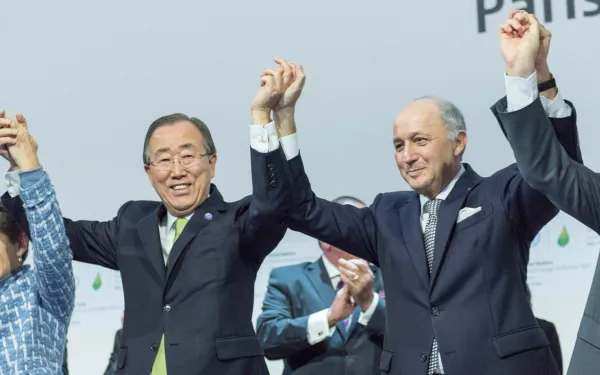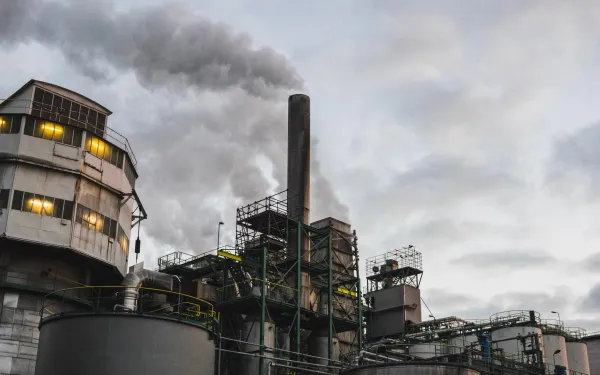
Project
Protecting the health of La Oroya's residents from toxic pollution
For more than 20 years, residents of La Oroya have been seeking justice and reparations after a metallurgical complex caused heavy metal pollution in their community—in violation of their fundamental rights—and the government failed to take adequate measures to protect them.
On March 22, 2024, the Inter-American Court of Human Rights issued its judgment in the case. It found Peru responsible and ordered it to adopt comprehensive reparation measures. This decision is a historic opportunity to restore the rights of the victims, as well as an important precedent for the protection of the right to a healthy environment in Latin America and for adequate state oversight of corporate activities.
Background
La Oroya is a small city in Peru’s central mountain range, in the department of Junín, about 176 km from Lima. It has a population of around 30,000 inhabitants.
There, in 1922, the U.S. company Cerro de Pasco Cooper Corporation installed the La Oroya Metallurgical Complex to process ore concentrates with high levels of lead, copper, zinc, silver and gold, as well as other contaminants such as sulfur, cadmium and arsenic.
The complex was nationalized in 1974 and operated by the State until 1997, when it was acquired by the US Doe Run Company through its subsidiary Doe Run Peru. In 2009, due to the company's financial crisis, the complex's operations were suspended.
Decades of damage to public health
The Peruvian State - due to the lack of adequate control systems, constant supervision, imposition of sanctions and adoption of immediate actions - has allowed the metallurgical complex to generate very high levels of contamination for decades that have seriously affected the health of residents of La Oroya for generations.
Those living in La Oroya have a higher risk or propensity to develop cancer due to historical exposure to heavy metals. While the health effects of toxic contamination are not immediately noticeable, they may be irreversible or become evident over the long term, affecting the population at various levels. Moreover, the impacts have been differentiated —and even more severe— among children, women and the elderly.
Most of the affected people presented lead levels higher than those recommended by the World Health Organization and, in some cases, higher levels of arsenic and cadmium; in addition to stress, anxiety, skin disorders, gastric problems, chronic headaches and respiratory or cardiac problems, among others.
The search for justice
Over time, several actions were brought at the national and international levels to obtain oversight of the metallurgical complex and its impacts, as well as to obtain redress for the violation of the rights of affected people.
AIDA became involved with La Oroya in 1997 and, since then, we’ve employed various strategies to protect public health, the environment and the rights of its inhabitants.
In 2002, our publication La Oroya Cannot Wait helped to make La Oroya's situation visible internationally and demand remedial measures.
That same year, a group of residents of La Oroya filed an enforcement action against the Ministry of Health and the General Directorate of Environmental Health to protect their rights and those of the rest of the population.
In 2006, they obtained a partially favorable decision from the Constitutional Court that ordered protective measures. However, after more than 14 years, no measures were taken to implement the ruling and the highest court did not take action to enforce it.
Given the lack of effective responses at the national level, AIDA —together with an international coalition of organizations— took the case to the Inter-American Commission on Human Rights (IACHR) and in November 2005 requested measures to protect the right to life, personal integrity and health of the people affected. In 2006, we filed a complaint with the IACHR against the Peruvian State for the violation of the human rights of La Oroya residents.
In 2007, in response to the petition, the IACHR granted protection measures to 65 people from La Oroya and in 2016 extended them to another 15.
Current Situation
To date, the protection measures granted by the IACHR are still in effect. Although the State has issued some decisions to somewhat control the company and the levels of contamination in the area, these have not been effective in protecting the rights of the population or in urgently implementing the necessary actions in La Oroya.
Although the levels of lead and other heavy metals in the blood have decreased since the suspension of operations at the complex, this does not imply that the effects of the contamination have disappeared because the metals remain in other parts of the body and their impacts can appear over the years. The State has not carried out a comprehensive diagnosis and follow-up of the people who were highly exposed to heavy metals at La Oroya. There is also a lack of an epidemiological and blood study on children to show the current state of contamination of the population and its comparison with the studies carried out between 1999 and 2005.
The case before the Inter-American Court
As for the international complaint, in October 2021 —15 years after the process began— the IACHR adopted a decision on the merits of the case and submitted it to the Inter-American Court of Human Rights, after establishing the international responsibility of the Peruvian State in the violation of human rights of residents of La Oroya.
The Court heard the case at a public hearing in October 2022. More than a year later, on March 22, 2024, the international court issued its judgment. In its ruling, the first of its kind, it held Peru responsible for violating the rights of the residents of La Oroya and ordered the government to adopt comprehensive reparation measures, including environmental remediation, reduction and mitigation of polluting emissions, air quality monitoring, free and specialized medical care, compensation, and a resettlement plan for the affected people.
Partners:

Related projects

Five years after the Paris Agreement, climate justice is more urgent than ever
On December 12, 2015, the Paris Agreement was reached. Five years later, its effective implementation is more important than ever. One of the agreement’s most significant advances was to reiterate that States must, "when taking action to address climate change, respect, promote and consider their respective obligations on human rights, the right to health, the rights of indigenous peoples, local communities, migrants, children, persons with disabilities and people in vulnerable situations and the right to development, as well as gender equality, empowerment of women and intergenerational equity.” This aspect is one of the outstanding issues, and also one of the great opportunities, of the Paris Agreement. In 2015, I had the privilege of participating in the twenty-first Conference of the Parties (COP21) to the United Nations Framework Convention on Climate Change, where the agreement was adopted. Thanks to the live broadcast, I saw the last hammer blow of this historic summit on my phone while on the train to the airport. I traded celebratory hugs with dozens of colleagues for arriving a day earlier to celebrate with my family. It was worth it. After all, my contribution had concluded a few hours earlier. Over the five years prior, and with full intensity during the COP21, I reviewed drafts, and spoke with missions and colleagues about how crucial it was to include human rights in the climate agreement. My priority—shared by colleagues from organizations, some government representatives and international entities—was to ensure a strong agreement, including the obligation to consider and respect human rights. For some people, this was an obstacle, even inappropriate, as they saw the climate crisis as a purely technical issue. Some delegations told me that human rights issues are another area entirely. We insisted on the point until we achieved it, not out of stubbornness (although there may have been some of that), but because in essence the climate crisis affects our rights, our lives and all of us. That’s why it is vital to put human rights at the center of climate action. Otherwise, these actions are incomplete. This is evidenced by the reality of the climate crisis, translated for example into the damages sustained by millions of people and communities by the hurricanes and storms that have, in recent months, devastated coastal areas in Nicaragua, Guatemala, Mexico and the Caribbean; the floods in South Asia; the droughts in northern Mexico; and the devastating fires in the Amazon, California and Australia. The most vulnerable people and communities who have contributed least to the crisis are disproportionately affected. It is therefore possible, and necessary, to find balance through a human rights approach. It’s necessary to hold States, companies and even some sectors of the population accountable. Responsibility with a sense of equity is one of the fundamental principles of human rights. In fact, the 2020 UN Emissions Gap Report concludes by saying, "Equity is central to addressing lifestyles. The emissions of the richest 1 per cent of the global population account for more than twice the combined share of the poorest 50 per cent." Communities, movements and peoples around the world have demanded—even in court—effective climate action that respects their rights. This has been reiterated by the United Nations. But climate action is still largely considered a question of numbers, tons of emissions to be reduced and hectares to be conserved. People and communities, despite being the ones who live the consequences, remain on the periphery of this action. Ensuring a true human rights perspective would help raise ambition and the level of obligations and outcomes. It would also allow impacts to be considered in a comprehensive manner and, as the IPCC concluded, take into account ancestral knowledge and social justice, which are central elements in finding effective solutions. Therein lies the opportunity that is being lost. The scientific community today confirms the widening gap between the current situation and where we should be in reducing emissions. According to the recent UN emissions gap report, emissions were reduced in the last year due to the suspension of activities caused by the pandemic, while in the previous year they had continued to increase. In fact, despite the pandemic, which is also linked to environmental degradation, countries in Latin America and the Caribbean, as in other regions, continue to rely mostly on fossil fuels, even for the economic recovery following the pandemic. This trend ignores the provisions of the Paris Agreement on the obligation of States to reduce emissions and implement effective measures while respecting human rights. It’s an element yet to be fulfilled, and a fundamental tool for States to increase their ambition and move towards the solutions that have as yet proven elusive. The five-year anniversary of this Agreement is a good time to remember it and to demand its implementation. If not, the most vulnerable communities will continue to suffer the consequences, and global inequalities will continue to deepen. Then, there will also be an increase in lawsuits and demands for a solution that the agreement itself incorporated. One element of leadership would be to put people and communities at the center of climate action. This is what I mean when I talk about climate justice, a great opportunity that many of us will continue to promote.
Read more
5 things you should know about methane
Although its presence in the atmosphere is less than that of carbon dioxide (CO2)—the most abundant and well-known greenhouse gas—methane is much more effective at retaining heat due to its chemical composition. Therefore, adding smaller amounts of methane to the atmosphere can have an effect equal to that of adding tremendous amounts of CO2. Since 2006, the amount of methane in the atmosphere has grown considerably—by about 25 million tons per year. Studies have associated this increase with the leakage and burning of methane from the extraction of unconventional hydrocarbons through the process of fracking, or hydraulic fracturing. Although extracting gas through fracking is sold as a “greener” alternative to other fossil fuels, it is a false narratiave that must be combatted. In general, all activities that cause methane emissions aggravate the climate crisis and the increasingly urgent need to combat air pollution. The common understanding of methane is inaccurate. Therefore, it’s necessary to generate more awareness about what it is and what its real impacts are. What follows are five basic facts about methane. 1. Methane is a short-lived greenhouse gas and climate pollutant Methane is a greenhouse gas.The Greenhouse Effect is a natural phenomena in which the atmosphere, composed of different gases, captures some rays of the sun and keeps them trapped in order to balance the temperature of the planet. When an excess of gases such as methane are emitted, the atmosphere traps more heat than necessary, leading to global warming. Methane has 67 times more power than CO2 to warm the planet over a 20-year period. Its emissions are responsible for nearly 25 percent of global warming. And since it stays less time in the atmosphere—12 years on average (CO2 stays for centuries)—it is among the Short Lived Climate Pollutants (SLCPs), which cause 40-45 percent of global warming and damage air quality. 2. Methane primarily is produced from human sources About 60 percent of the methane in the atmosphere is considered by scientists to be caused by human activity, while the other 40 percent comes from natural sources like wetlands, volcanoes, and permafrost. Human sources include livestock, gas and petroleum exploitation, rice farming, mining (particularly coal mining), and landfills. It should be noted that, according to scientific evidence, reservoirs are also an important source of methane. They generate 1.3 percent of all greenhouse gases worldwide each year, more than all of Canada's polluting emissions, and 80 percent of that pollution is from methane. 3. Methane directly and indirectly degrades air quality Large amounts of methane are intentionally leaked or released during the exploitation, processing, and transportation of oil and gas. In the United States alone, such direct emissions amount to 13 million tons each year. When released into the atmosphere, methane is accompanied by other toxic pollutants such as benzene, formaldehyde, and ethylbenzene. In addition, by interacting with solar radiation, methane promotes the formation of ground-level ozone (O3), another short-lived climate pollutant (CCVC) and the main component of smog. Methane gas flaring also produces black carbon and volatile organic compounds (VOCs), which are also CCVCs. 4. Methane causes serious damage to human health As mentioned, methane emissions promote the formation of ozone found in the lower layers of the atmosphere, which has serious impacts on public health. It irritates the airways, generates a feeling of burning and shortness of breath, complicates asthma, causes lung dysfunction and even premature death, and alters the immune system's response, reducing its ability to respond to diseases such as COVID-19, which mainly affects the airways. And since methane burning generates black carbon, it is relevant to point out that it is a key component of particulate matter (PM 2.5)—particles that are 35 times smaller than a grain of sand. These particles cannot be filtered or retained naturally in the nose, and can even enter the lungs. Particulate matter is the air pollutant most frequently associated with cardiovascular, respiratory, and pulmonary diseases, including lung cancer. 5. It is urgent to regulate and curb methane emissions Since methane, in addition to aggravating the climate crisis, deteriorates air quality and with it human health, it is urgent to act to curb its emissions. Civil society must demand that governments efficiently regulate methane emissions from the hydrocarbon industry and other sectors such as coal mining and industrial livestock. In addition, we must demand the monitoring of emissions, as well as the production and dissemination of timely information about methane’s damage to our air quality.
Read more
5 things you should know about methane
Although its presence in the atmosphere is less than that of carbon dioxide (CO2)—the most abundant and well-known greenhouse gas—methane is much more effective at retaining heat due to its chemical composition. Therefore, adding smaller amounts of methane to the atmosphere can have an effect equal to that of adding tremendous amounts of CO2. Since 2006, the amount of methane in the atmosphere has grown considerably—by about 25 million tons per year. Studies have associated this increase with the leakage and burning of methane from the extraction of unconventional hydrocarbons through the process of fracking, or hydraulic fracturing. Although extracting gas through fracking is sold as a “greener” alternative to other fossil fuels, it is a false narratiave that must be combatted. In general, all activities that cause methane emissions aggravate the climate crisis and the increasingly urgent need to combat air pollution. The common understanding of methane is inaccurate. Therefore, it’s necessary to generate more awareness about what it is and what its real impacts are. What follows are five basic facts about methane. 1. Methane is a short-lived greenhouse gas and climate pollutant Methane is a greenhouse gas.The Greenhouse Effect is a natural phenomena in which the atmosphere, composed of different gases, captures some rays of the sun and keeps them trapped in order to balance the temperature of the planet. When an excess of gases such as methane are emitted, the atmosphere traps more heat than necessary, leading to global warming. Methane has 67 times more power than CO2 to warm the planet over a 20-year period. Its emissions are responsible for nearly 25 percent of global warming. And since it stays less time in the atmosphere—12 years on average (CO2 stays for centuries)—it is among the Short Lived Climate Pollutants (SLCPs), which cause 40-45 percent of global warming and damage air quality. 2. Methane primarily is produced from human sources About 60 percent of the methane in the atmosphere is considered by scientists to be caused by human activity, while the other 40 percent comes from natural sources like wetlands, volcanoes, and permafrost. Human sources include livestock, gas and petroleum exploitation, rice farming, mining (particularly coal mining), and landfills. It should be noted that, according to scientific evidence, reservoirs are also an important source of methane. They generate 1.3 percent of all greenhouse gases worldwide each year, more than all of Canada's polluting emissions, and 80 percent of that pollution is from methane. 3. Methane directly and indirectly degrades air quality Large amounts of methane are intentionally leaked or released during the exploitation, processing, and transportation of oil and gas. In the United States alone, such direct emissions amount to 13 million tons each year. When released into the atmosphere, methane is accompanied by other toxic pollutants such as benzene, formaldehyde, and ethylbenzene. In addition, by interacting with solar radiation, methane promotes the formation of ground-level ozone (O3), another short-lived climate pollutant (CCVC) and the main component of smog. Methane gas flaring also produces black carbon and volatile organic compounds (VOCs), which are also CCVCs. 4. Methane causes serious damage to human health As mentioned, methane emissions promote the formation of ozone found in the lower layers of the atmosphere, which has serious impacts on public health. It irritates the airways, generates a feeling of burning and shortness of breath, complicates asthma, causes lung dysfunction and even premature death, and alters the immune system's response, reducing its ability to respond to diseases such as COVID-19, which mainly affects the airways. And since methane burning generates black carbon, it is relevant to point out that it is a key component of particulate matter (PM 2.5)—particles that are 35 times smaller than a grain of sand. These particles cannot be filtered or retained naturally in the nose, and can even enter the lungs. Particulate matter is the air pollutant most frequently associated with cardiovascular, respiratory, and pulmonary diseases, including lung cancer. 5. It is urgent to regulate and curb methane emissions Since methane, in addition to aggravating the climate crisis, deteriorates air quality and with it human health, it is urgent to act to curb its emissions. Civil society must demand that governments efficiently regulate methane emissions from the hydrocarbon industry and other sectors such as coal mining and industrial livestock. In addition, we must demand the monitoring of emissions, as well as the production and dissemination of timely information about methane’s damage to our air quality.
Read more